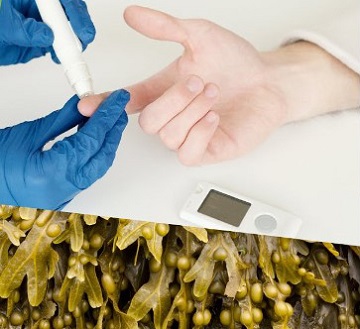Nikhil Prasad Fact checked by:Thailand Medical News Team Jun 18, 2024 10 months, 1 week, 23 hours ago
Diabetes News: Diabetes is a major health concern worldwide, affecting millions of people and often leading to severe complications. Among the different types of diabetes, Type 2 Diabetes Mellitus (T2DM) is the most common, accounting for 90% of all cases. Managing this condition typically involves medication, diet, and lifestyle changes. Recent research suggests that certain types of brown seaweed may offer a new natural remedy for controlling blood sugar levels in people with T2DM. But how effective is it? Let's dive into a recent study to find out.
 Brown Seaweed Can Help Control Blood Sugar Levels
What is Brown Seaweed?
Brown Seaweed Can Help Control Blood Sugar Levels
What is Brown Seaweed?
Brown seaweed, found along coastlines around the world, is packed with nutrients and bioactive compounds. Two species, in particular, Sargassum fusiforme (commonly known as Hijiki) and Fucus vesiculosus, have been under the scientific spotlight for their potential health benefits. These seaweeds are rich in dietary fibers, omega-3 fatty acids, carotenoids, and various vitamins and minerals. Researchers believe that these components can help regulate blood sugar levels, improve lipid profiles, and even enhance feelings of fullness, which can prevent overeating - a common issue in managing diabetes.
The Study: Testing the Waters
A group of researchers from the Erasmus University Medical Center-The Netherlands, Ocean University of China, Qingdao-China and Franciscus Gasthuis & Vlietland-The Netherlands conducted a randomized, double-blind, placebo-controlled trial to test the effects of these brown seaweeds on glucose regulation in patients with T2DM. The study that is covered in this
Diabetes News report involved thirty-six participants who were divided into three groups. One group received 5 grams of dried Sargassum fusiforme daily, another received 5 grams of dried Fucus vesiculosus, and the control group received 0.5 grams of dried Porphyra (a type of red algae known as nori). The trial lasted for five weeks, during which participants continued their usual diabetes treatment alongside the seaweed supplements.
Continuous Glucose Monitoring
The primary focus of the study was to observe changes in blood glucose levels using continuous glucose monitoring (CGM). CGM provides real-time data on glucose levels throughout the day and night, offering a comprehensive picture of how the body manages blood sugar.
Results: A Mixed Bag
The study's results were somewhat surprising. While there were changes in blood glucose levels, they were not statistically significant between the groups. For instance, the Sargassum fusiforme group saw their weekly average glucose levels change from 8.2 mmol/L to 9.0 mmol/L, while the Fucus vesiculosus group’s levels went from 10.1 mmol/L to 9.2 mmol/L. These changes were not significantly different from those observed in the control group.
Secondary Outcomes: Body Weight and Lipid Levels
The researchers also looked at secondary outcomes, such as changes in body weight, dietary intak
e, and plasma lipid levels. Again, no significant differences were found between the groups. There were slight reductions in body weight and waist circumference in the Sargassum fusiforme group, but these changes were not significant enough to draw firm conclusions.
Challenges and Considerations
One challenge in the study was ensuring participants' compliance with the seaweed regimen. Some participants reported gastrointestinal discomfort, particularly in the Fucus vesiculosus group, which led to withdrawals. This highlights a potential issue with the palatability and tolerability of consuming seaweed in its natural form over an extended period.
Moreover, the dosage used in the study (5 grams per day) might have been too low to elicit a significant effect, especially considering the advanced state of T2DM in the participants. Higher doses or longer duration might be needed to observe more pronounced effects.
The Unexpected Role of Porphyra
Interestingly, the control group, which received Porphyra, also showed some improvement in blood glucose levels and a reduction in the use of antidiabetic drugs. This suggests that even small amounts of seaweed might have some beneficial effects, although the exact mechanisms remain unclear.
Conclusion: More Research Needed
While this study did not find significant evidence that Sargassum fusiforme or Fucus vesiculosus in their natural form can effectively control blood glucose levels in T2DM patients, it opens the door for further research. Future studies should explore higher doses, longer intervention periods, and possibly the use of seaweed extracts to maximize the potential benefits. Additionally, ensuring participant compliance and addressing any gastrointestinal issues will be crucial for the success of such interventions.
The study findings were published in the peer reviewed journal: Nutrients.
https://www.mdpi.com/2072-6643/16/12/1837
For the latest
Diabetes News, keep on logging to Thailand Medical News.
Read also:
https://www.thailandmedical.news/news/australian-study-finds-that-supplementation-with-citrus-bioflavonoids-helps-with-management-of-type-2-diabetes
https://www.thailandmedical.news/news/herbs-and-phytochemicals-flavonoids-from-cyclocarya-paliurus-can-treat-diabetes-via-pik3ca-and-by-promoting-beta-tc-6-cell-proliferation
https://www.thailandmedical.news/news/breaking-diabetes-news-a-study-for-the-first-time-finds-that-too-much-salt-consumption-can-also-increase-risk-of-diabetes
